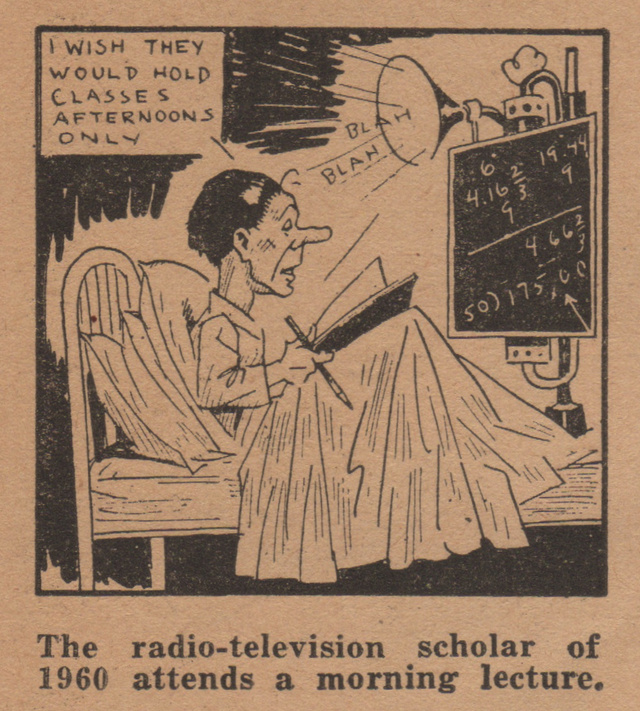One of our most popular posts this year centered around a prescient set of predictions that Isaac Asimov made for 2014, way back in 1964. Asimov, however, wasn’t the only one whose vision of the future seems to have been realized.
The web site Paleofuture features a 1934 issue of Everyday Science and Mechanics magazine, where Northwestern University president Walter Dill Scott made some farsighted pronouncements of his own. Scott believed that the physical college campus would no longer need to be a lynchpin for education, and that students could learn by way of radio and pictures. Fax machines and televisions would allow students to access lecture materials worldwide, and ensure that researchers could conduct their research remotely. He also figured that we’d all end up commuting by planes. Everyday Science and Mechanics wrote:
The university of twenty-five years from now will be a different looking place, says President Scott of Northwestern. Instead of concentrating faculty and students around a campus, they will “commute” by air, and the university will be surrounded by airports and hangars. The course will be carried on, to a large extent, by radio and pictures. Facsimile broadcasting and television will enlarge greatly the range of a library; and research may be carried on by scholars at great distances.
Airports and hangars aside, Scott’s conjectures hit pretty close to home. While fax machines and radio may have been supplanted by the Internet, the essence of our educational advancements is the same: university students can often listen to lectures and complete assignments online, spending only a few short face-to-face hours in the classroom. Other times, classes may be wholly available online, and students may never step foot on campus altogether. Scholars, too, can trawl through databases like JSTOR and PsycINFO without getting out of bed, conducting research as they travel.
In fact, today almost anyone can have access to university knowledge. Feel like taking a Technology Entrepreneurship class offered by Stanford, or learn about Walt Whitman, courtesy of The University of Iowa? Nothing simpler! Massive Open Online courses (MOOCs) are proliferating, and you can download audio & video lectures from top tier universities. Visit our collection of 825 Free Online Courses to see what we mean.
In the end, it’s a good thing Scott was right. Otherwise, there’d be no Open Culture.
Ilia Blinderman is a Montreal-based culture and science writer. Follow him at @iliablinderman.
Related Content:
Isaac Asimov Predicts in 1964 What the World Will Look Like Today — in 2014
Arthur C. Clarke Predicts the Future in 1964 … And Kind of Nails It
Walter Cronkite Imagines the Home of the 21st Century … Back in 1967
The Internet Imagined in 1969
Marshall McLuhan Announces That The World is a Global Village



Leave a Reply